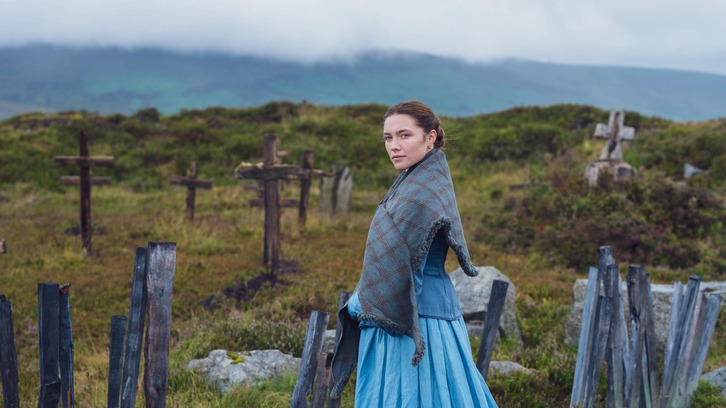Lavishly dark in its period drama trappings, The Wonder opens with a bang - a modern-day set design is narrated by a woman who reminds you that these are the character’s stories and they believe them. Everyone has their own story - be it science or religion, and such is the crux of the central debate at play in Sebastián Lelio’s latest. An English Nurse is called into Ireland question a so-called miracle child who hasn’t eaten for months yet looks perfectly healthy.
Context is key here and the film uses the backdrop of the Irish famine to tell this story - it’s routinely felt, Tom Burke’s character, a stuffy upper lip Telegraph journalist - has lost his entire family to the hunger. Pugh’s character isn’t ready for the community’s open hostility towards her - and the tension can be cut with a knife edge. To watch over the child, a Pugh’s Nurse is joined by a Nun - and they are told to report back to an oversight committee of ranging political beliefs. How far would you go as someone brought in just to watch when you know you have the power to intervene? The Wonder asks - questioning those who stand by and do nothing. It adopts a quiet approach to this full of nuance, even if you don’t understand certain actions the film gives convincing justification for them - and the performances at its core get the most out of it. Florence Pugh is of course excellent but she always is, a commanding screen presence of quiet, burning rage.
Adapting Emma Donaghue’s 2016 novel is no easy task but Lelio lives up to the opportunity for the most part in a film that's only aging well. Potentially the film moves a little too tepidly and feels a little too understated until its zero-to-a-hundred second act, but it gets its point across effectively - the framing device bookending the movie opening in a movie studi doesn’t feel quite as effective as it should and takes you out of the film rather than enhances it - until the title credits show up you'll be confused for a few seconds as to whether you're actually watching a period drama at all; but the transition into the narrative was a delight and shows the true power that stories have in us all. There are parts where The Wonder can feel dry but instead it manages to overcome that thanks in part to its focus on character; human emotion - and reaction to the science/religion debate that has occupied humanity for eternity - and this film here takes place in harsher times too, when faith was more dominant over fact.
Kila Lord Cassidy is going overlooked opposite Burke and Pugh but it’s as much her movie as it is theirs, a committed unflinching performance. Her very presence on screen is enough to say a thousand words even with a role of few. Pugh is in command over her own character her in ways unlike no other performance this year or the last; the more showboaty Don’t Worry Darling or Black Widow sacrificed for a return to the Pugh of Lady Macbeth (which cinematographer Ari Wegner also shot, and is excellent again here; on the back of an undefeated 2021 showcasing her status as one of the best currently working cinematographers) - it’s a drama that’s only warming to me with time. Sebastián Lelio’s direction too is a rare feat of accomplished brilliance as the filmmaker continues to make nothing but stellar films, the 2017 Disobedience shows his understanding of character and humanity, and it’s not the first time he has put religion and faith under the spotlight. Here he does so again, effectively to the letter. It hits hard and to the core - and may not grow on you immediately but the more time removed from The Wonder the more you bask in its brilliance.
Sign Up for the SpoilerTV Newsletter where we talk all things TV!
Recommendations
Subscribe to:
Post Comments (Atom)





